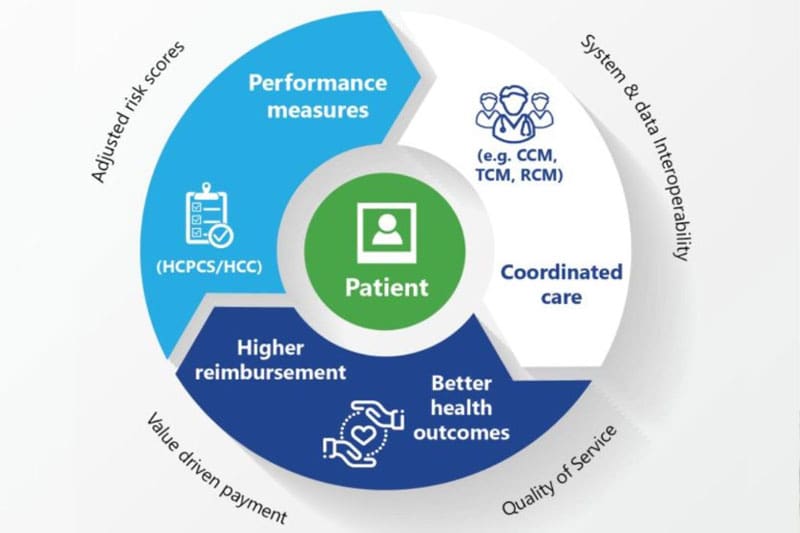
In the evolving landscape of healthcare, the paradigm shift towards value-based medicine is reshaping how chronic diseases are managed. At the heart of this transformation lies Chronic Care Management (CCM), a pivotal component in improving patient outcomes, enhancing patient satisfaction, and reducing overall healthcare costs. This blog post delves into the intrinsic value of CCM within the framework of value-based medicine.
Understanding Value-Based Medicine
Value-based medicine emphasizes providing high-quality care while controlling costs. It prioritizes patient outcomes, aligning healthcare providers’ incentives with patient health rather than the volume of services rendered. This approach contrasts sharply with the traditional fee-for-service model, which often encourages quantity over quality. By focusing on outcomes, value-based care aims to foster a more sustainable and effective healthcare system.
The Role of Chronic Care Management
Chronic Care Management refers to the systematic coordination of healthcare services and support for patients with chronic conditions such as diabetes, hypertension, and heart disease to name a few. Effective CCM involves personalized care plans, regular monitoring, patient education, and coordinated communication among healthcare providers.
Key Components of Chronic Care Management
1. Personalized Care Plans: Tailored treatment plans based on the patient’s specific health conditions, lifestyle, and preferences.
2. Regular Monitoring and Follow-ups: Continuous tracking of health metrics and frequent check-ins to adjust care plans as necessary.
3. Patient Education: Empowering patients with the knowledge and skills to manage their conditions effectively.
4. Care Coordination: Ensuring seamless communication and collaboration among healthcare providers to avoid redundant or conflicting treatments.
Benefits of Chronic Care Management in Value-Based Medicine
1. Improved Patient Outcomes
CCM’s comprehensive and continuous nature helps in managing chronic conditions more effectively, reducing complications and hospitalizations. Patients receiving coordinated care often experience better health outcomes due to proactive disease management.
2. Enhanced Patient Satisfaction
Patients with chronic conditions frequently require complex and continuous care. CCM ensures that they receive consistent support, which improves their overall satisfaction with the healthcare system. Personalized care plans and regular follow-ups make patients feel valued and understood.
3. Cost Reduction
By preventing complications and avoiding unnecessary hospital admissions, CCM significantly reduces healthcare costs. The focus on early intervention and preventive care mitigates the financial burden on both the healthcare system and patients.
4. Reduced Healthcare Disparities
CCM helps address healthcare disparities by providing structured and consistent care to underserved populations who often experience higher rates of chronic diseases. Through targeted interventions and coordinated care, CCM can bridge the gap in health outcomes among different demographic groups.
5. Provider Incentives Aligned with Patient Health
In value-based medicine, healthcare providers are incentivized to keep patients healthy. CCM aligns with this model by focusing on long-term health management rather than episodic care, encouraging providers to invest in preventive measures and ongoing patient support.
Challenges and the Path Forward
Despite its benefits, implementing effective CCM can be challenging. It requires robust healthcare infrastructure, seamless communication systems, and trained personnel. Additionally, patients need to be actively engaged in their care, which demands significant effort in patient education and empowerment.
Moving forward, the integration of technology, such as telehealth and health information systems, will play a crucial role in enhancing CCM. These tools can facilitate better monitoring, improve communication between patients and providers, and ensure more efficient care coordination.
Conclusion
Chronic Care Management (CCM) is a cornerstone of value-based medicine. It offers a structured approach to managing chronic diseases that improves patient outcomes,
enhances satisfaction, and reduces costs. As healthcare systems continue to shift towards value-based models, the importance of CCM cannot be overstated. CCM exemplifies the true essence of value-based healthcare by addressing the needs of patients with chronic conditions through coordinated, personalized, and proactive care.
Investing in and optimizing CCM will be essential for healthcare providers aiming to deliver high-quality, cost-effective care that meets the demands of the modern healthcare landscape.



